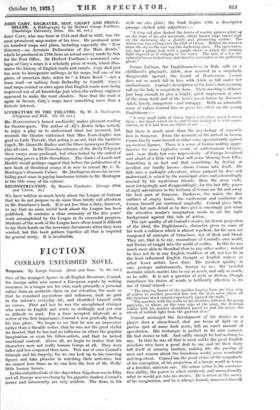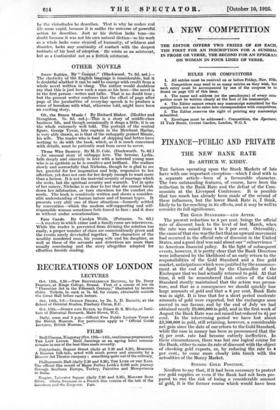FICTION
CONRAD'S UNFINISHED NOVEL
Oxi of the strangest figures in all English literature, Conrad, the foreign sailor who earned a European repute by writing romances in a tongue not his own, made primarily a personal rather than an aesthetic claim on our attention, the more so that he remained mysterious and unknown, took no part in the nation's everyday life, and identified himself with no causes. First and last he was the unexplained stranger who wrote in English and wrote so strikingly and yet was so difficult to read. For a time accepted wholesale as a writer of the first importahce, Conrad is now gradually finding his true place. We begin to see that he was an impressive rather than a likeable writer, that he was not the great stylist we fancied, that he has had no influence on either the popular imagination or even his fellow-artists, and that he lacked emotional content. Above all, we begin to realize that his characters were not really human beings at all. They were taller and less corporeal than men. This was at once Conrad's triumph and his-tragedy; for we can look up to his towering figures and take pleasure in watching their activities, but we cannot love them as we can love the best of Mr. Wells' little human heroes.
In this unfinished tale of the days when Napoleon was in Elba and all Europe was overhung by his gigantic shadow, Conrad's power and inhumanity are very evident. The flaws in his
style are also plain;; the book. begins with a_ descriptive passage clotted with adjectives :- " A deep red glow flushed the fronts of marble palaces piled up on the slope of an arid mountain, whose barren ridge traced high on the darkening sky a ghostly and glimmering outline. The winter sun was setting over the Gulf of Genoa. Behind the massive shore the sky to the east was like darkening glass. The open water, too, had a glassy look with a purple sheen in which the evening light lingered as if clinging to the water. The sails of a few be- calmed feluccas looked rosy and cheerful, motionless in the gathering gloom."
Cosmo Latham, the Englishman-hero, in Italy calls on a childhood's playmate, Adele, now married to a singularly
disagreeable upstart, the Count of Montevesso. Cosmo does not so much fall in love with Adele as fall under her enchantment. Conrad's description of the hero's first morning call on the lady is exquisitely done. Their meeting is delayed just long enough to give a bright, quick impression at once of the room itself and of the hero's mood before he dischi-erk Adele, lovely, competent—and unhappy. With an admirable sense of values Conrad lets us guess her effect on the young Englishman :- " A very small table of ebony inlaid with silver stocd between them ; her hand rested on it, and Cosmo looked at it with appro. ciation, as if it had been an object of art. . . . "
But there is much more than the psychology of romantic love in Suspense. From the moment of his arrival in Genoa, Cosmo has by some hazard or other come up constantly against mysterious figures. There is a sense of Genoa waiting appre- hensive for some explosive event, of subterranean intrigue, and—more dimly but very impressively—of Europe becalmed and afraid of a little wind that will come blowing from Elba. Something is on foot and that something—by destiny or accident one hardly knows—draws Cosmo into itself. He falls into a midnight adventure, whose purport he does not understand, is seized by the municipal shirri and astoundingly rescued by his mysterious friends. Here the story ends, most intriguingly and disappointingly, for the last fifty pages of night adventures in the harbour of Genoa are far and away the best part of Suspense. Darkness, the water, the dim outlines of empty boats, the excitement and confusion of Cosmo himself are combined magically. Conrad gives little detail, but such detail as he does give is unerringly just what the attentive reader's imagination needs to set the right background against this tale of action. .
The epic quality of all Conrad's stories, his heroic projection of the ideal, the Englishman's, character gives to some of his work a coldness which is almost repellent, for his men are composed of concepts of behaviour, not of flesh and blood. They are, that is to say, emanations of Conrad's own world, not flashes of insight into the world of reality. In this he was much more akin to Stendhal than to any other writer : indeed he does not lie in any English tradition at all, nor has he in the least influenced English thought or English writers us other lesser artists have done. His greatest quality is one, perhaps unfortunately, foreign to us : the tasteful restraint which enables him to say as much, and only as much, as he wills. It is not a question of style or diction, though sometimes his choice of words is brilliantly effective in its use of visual stimuli :— " The swaying flames of the candles leaping from one long strip of mirror to another preceded him into the next salon where all the furniture stood ranged expectantly against the walls." " The mariner, with the sculls on his shoulder, followed the group patiently, to where, on the very edge of the quay, the Austrian soldier with his musket shouldered .paced to and fro across the streak of reddish light from tho garrison door."
Conrad envisaged the development of his stories as a player does a chess-board, shot one beam of light on a precise spot of some dark scene, left an exact amount of speculation. His technique is perfect in its own manner. He had stories to tell. And oddly enough he had nothing to say. In that he was all that is most unlike the great English novelists who have a great deal to say and let their story tell itself at seeming random, making life, the passing of men and women about the humdrum world, seem wonderful and important. Conrad has the great virtue of the magnitude of his conception, of his projection of a heroic world in terms. of a familiar, unheroic one. His minor virtue is his construc- tive ability, the power to select ruthlessly and unemotionally what he would put into his stories. lie is never at the mercy of his imagination. and he is always formal, unmoved himself
by the vicissitudes he describes. That is why he makes real life seem vapid, because it is unlike the universe of powerful action he describes. Just as his diction lacks tone—tno doubt because it was not his own natural diction—so his work as a whole lacks some elernentof humanity, of wildness and disorder, lacks any continuity :of :contact -with the deepest instincts of his land ,of-lificiption. f He wrote as an aristocrat, but as a Continerdid not as a British aristocrat.



























































 Previous page
Previous page